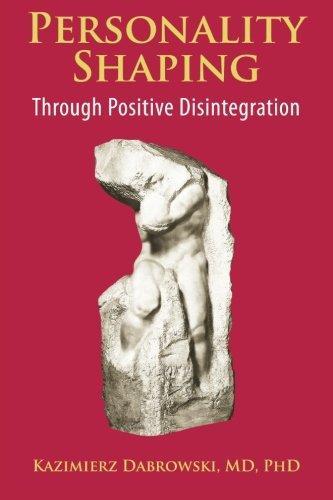Goodreads Review of Personality-Shaping Through Positive Disintegration
3 stars
I think Dabrowski is onto something here, but his approach leaves a lot to be desired.
His starting point is the observation that many of us experience dark moments in life where we do not sit well with ourselves. We feel a gulf between who we are and who we could be, and this leads to total despair. Dabrowski calls this disintegration.
Under Dabrowski’s system, everyone experiences a first disintegration while maturing in the teenage years (or potentially earlier), and we reintegrate around the norms and values of the society in which we live. But, for some people, who Dabrowski argues are the gifted few, they realize at some point in adulthood that the societal norms and values are baseless and they disintegrate once more. When this happens, there are four options: suicide, psychosis, reintegration at the first level, or a novel integration based around an individual hierarchy of values. …
I think Dabrowski is onto something here, but his approach leaves a lot to be desired.
His starting point is the observation that many of us experience dark moments in life where we do not sit well with ourselves. We feel a gulf between who we are and who we could be, and this leads to total despair. Dabrowski calls this disintegration.
Under Dabrowski’s system, everyone experiences a first disintegration while maturing in the teenage years (or potentially earlier), and we reintegrate around the norms and values of the society in which we live. But, for some people, who Dabrowski argues are the gifted few, they realize at some point in adulthood that the societal norms and values are baseless and they disintegrate once more. When this happens, there are four options: suicide, psychosis, reintegration at the first level, or a novel integration based around an individual hierarchy of values. This latter is effectively self actualization. It is immensely hard to reach, and Dabrowski argues that most who disintegrate a second time experience reintegration at the primary level.
He points to a number of prominent individuals, like Kierkegaard, Michelangelo, and Augustine, who experienced the “darkness of the soul” and came out better on the other side. He adds that self education on the process improves outcomes.
For all intents and purposes, I think he’s right. But, I do not think the secondary integration is something limited to a gifted few. Anyone can do it with enough willpower, drive, and self-reflection.
It’s hard work, and I feel like I’m in the thick of it now. Dabrowski helped me make sense of what I’m going through, and it does seem to map on to what others discuss (for instance, Lacan’s subjective destitution). I found it resonated with my own life.
Still, Dabrowski‘s writing style is DENSE, so the book was a slog.

